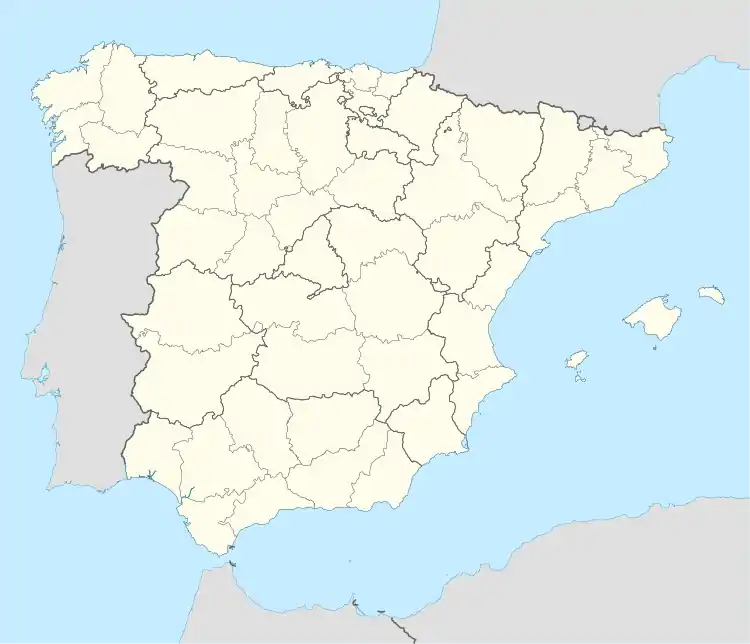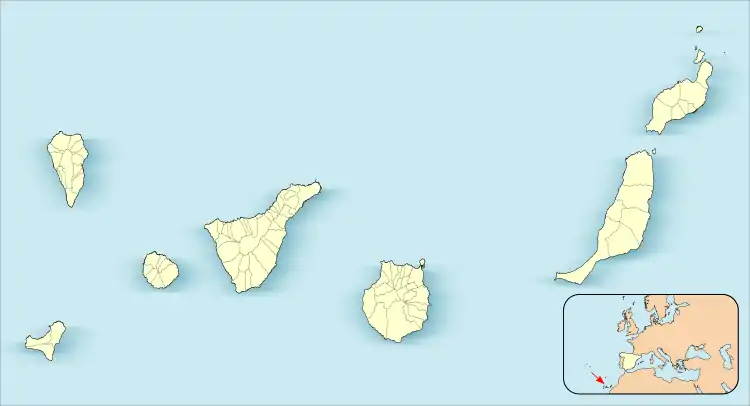Segunda División Pro (women)
The Segunda División Pro, also called Reto Iberdrola for sponsorship reasons, is the second level of league competition for Spanish women's football since the 2019–20 season.
| Founded | 2018 |
|---|---|
| Country | Spain |
| Confederation | UEFA |
| Number of teams | 32 |
| Level on pyramid | 2 |
| Promotion to | Primera División |
| Relegation to | Primera Nacional |
| Current: 2021–22 Segunda División Pro (women) | |
It is the female equivalent of the men's Segunda División and is run by the Royal Spanish Football Federation.
History
On 24 July 2018, the Royal Spanish Football Federation agreed to create a new second division between the Primera División, featuring 16 teams, and the Segunda División, in which 112 teams were involved.[1]
In its first season, the league was to be contested by 32 teams divided into two groups: two teams relegated from the 2018–19 Primera División and the 30 best teams from the 2018–19 Segunda División.
In July 2019, the new second tier was renamed as Segunda División Pro being later re-branded as Reto Iberdrola for sponsorship reasons. The level below which had carried that name previously recovered its former name of Primera Nacional.
On 10 June 2020, the Segunda División was granted professionalized league status.[2]
In early 2022, it was confirmed that the league structure would be altered again, after only three seasons: the existing Primera División would be a standalone professional league of 16 teams, the existing Segunda División Pro would become a single nationwide 16-team division known as the Primera División RFEF, a third tier of 32 teams (two regionalised 16-team groups, the same as the existing second tier) would be created as the Segunda División RFEF, and a fourth tier of 96 teams (six regionalised 16-team groups) would be created as the Tercera División RFEF, replacing the existing Primera Nacional division. These levels would be administered by the RFEF and more closely resemble the men's post-2021 structure, albeit only one professional league and six fourth-tier groups rather than five.[3]
Format
The 32 teams are divided into two groups according to geographical criteria. The two group winners promote directly to Primera División.[4]
2019–20 teams and locations

32 teams took part, 30 moving up from the 2018–19 Segunda División and 2 relegated from the 2018–19 Primera División.
Atlántida Matamá resigned to its place in the league. Sporting Gijón occupied its place as the next qualified team in their group from the previous season.[5]

| Team | Municipality |
|---|---|
| Alhama | Alhama de Murcia |
| Cáceres | Cáceres |
| Collerense | Palma de Mallorca |
| Córdoba | Córdoba |
| Femarguín | Mogán |
| Fundación Albacete | Albacete |
| Granada | Granada |
| Granadilla B | Granadilla de Abona |
| Juan Grande | San Bartolomé de Tirajana |
| Levante B | Valencia |
| Málaga | Málaga |
| Pozoalbense | Pozoblanco |
| Santa Teresa | Badajoz |
| Tacuense | San Cristóbal de La Laguna |
| Valencia B | Valencia |
| Villarreal | Villarreal |
Champions and promotions
| Season | North Group | South Group | Other promoted teams |
|---|---|---|---|
| 2019–20 | Athletic Club B (not promoted) | Santa Teresa | Eibar |
| 2020–21 | Alavés | Villarreal | N/A |
All-time Segunda División Pro table
| Pos | S | Team | Pld | W | D | L | GF | GA | GD | Pts | 2019–20 league |
|---|---|---|---|---|---|---|---|---|---|---|---|
| 1 | 1 | Santa Teresa | 22 | 16 | 3 | 3 | 43 | 15 | +28 | 51 | Segunda División |
| 2 | 1 | Granada | 22 | 16 | 2 | 4 | 43 | 15 | +28 | 50 | |
| 3 | 1 | Athletic Club B | 22 | 15 | 3 | 4 | 43 | 17 | +26 | 48 | |
| 4 | 1 | Fundación Albacete | 22 | 14 | 5 | 3 | 48 | 16 | +32 | 47 | |
| 5 | 1 | Eibar | 22 | 13 | 7 | 2 | 37 | 13 | +24 | 46 | |
| 6 | 1 | Barcelona | 22 | 14 | 3 | 5 | 61 | 28 | +33 | 45 | |
| 7 | 1 | Villarreal | 22 | 13 | 3 | 6 | 37 | 24 | +13 | 42 | |
| 8 | 1 | Osasuna | 22 | 13 | 2 | 7 | 41 | 24 | +17 | 41 | |
| 9 | 1 | Alavés | 22 | 12 | 5 | 5 | 38 | 26 | +12 | 41 | |
| 10 | 1 | Málaga | 22 | 9 | 9 | 4 | 28 | 21 | +7 | 36 | |
| 11 | 1 | Seagull | 22 | 10 | 5 | 7 | 38 | 27 | +11 | 35 | |
| 12 | 1 | Alhama | 22 | 9 | 8 | 5 | 40 | 31 | +9 | 35 | |
| 13 | 1 | AEM | 22 | 10 | 5 | 7 | 29 | 28 | +1 | 35 | |
| 14 | 1 | Zaragoza CFF | 22 | 10 | 2 | 10 | 43 | 46 | −3 | 32 | |
| 15 | 1 | Pozoalbense | 22 | 9 | 5 | 8 | 36 | 39 | −3 | 32 | |
| 16 | 1 | Oviedo | 22 | 9 | 4 | 9 | 37 | 37 | 0 | 31 | |
| 17 | 1 | Córdoba | 22 | 8 | 7 | 7 | 21 | 21 | 0 | 31 | |
| 18 | 1 | Cáceres | 22 | 8 | 6 | 8 | 36 | 36 | 0 | 30 | |
| 19 | 1 | Parquesol | 22 | 7 | 7 | 8 | 33 | 31 | +2 | 28 | |
| 20 | 1 | Granadilla B | 22 | 8 | 4 | 10 | 27 | 36 | −9 | 28 | |
| 21 | 1 | Femarguín | 22 | 8 | 3 | 11 | 34 | 36 | −2 | 27 | |
| 22 | 1 | Atlético de Madrid B | 22 | 7 | 5 | 10 | 32 | 34 | −2 | 26 | |
| 23 | 1 | Madrid CFF B | 22 | 7 | 5 | 10 | 27 | 40 | −13 | 26 | |
| 24 | 1 | Racing Santander | 22 | 8 | 1 | 13 | 37 | 35 | +2 | 25 | |
| 25 | 1 | Levante B | 22 | 6 | 6 | 10 | 31 | 33 | −2 | 24 | |
| 26 | 1 | Valencia B | 22 | 6 | 3 | 13 | 24 | 34 | −10 | 21 | |
| 27 | 1 | Friol | 22 | 6 | 1 | 15 | 25 | 55 | −30 | 19 | |
| 28 | 1 | Juan Grande | 22 | 4 | 4 | 14 | 28 | 39 | −11 | 16 | |
| 29 | 1 | Pozuelo de Alarcón | 22 | 4 | 1 | 17 | 12 | 40 | −28 | 13 | |
| 30 | 1 | Tacuense | 22 | 3 | 3 | 16 | 18 | 57 | −39 | 12 | |
| 31 | 1 | Collerense | 22 | 2 | 3 | 17 | 31 | 72 | −41 | 9 | |
| 32 | 1 | Sporting Gijón | 22 | 2 | 2 | 18 | 12 | 64 | −52 | 8 |
References
- "La RFEF crea una nueva competición para potenciar el fútbol femenino, la Primera División B" [RFEF creates a new competition for developing the women's football, the Primera División B] (in Spanish). Royal Spanish Football Federation. 24 July 2018. Retrieved 9 January 2019.
- Women’s soccer gains professional status in Spain, The Seattle Times, 10 June 2020
- Nuevo estructura de ligas de fútbol femenino a patir de 2022-2023 [New structure of women's football leagues from 2022-2023], Manel Expósito, Fútboleras, 10 February 2022 (in Spanish). Retrieved 18 April 2022
- "La Rfef revoluciona el fútbol femenino con una Primera B de sólo 32 equipos" [RFEF revolutionizes the women's football with a Primera B of only 32 teams] (in Spanish). Palco23. 5 July 2018. Retrieved 6 March 2019.
- "El Sporting Femenino jugará en la nueva 2ª División la próxima temporada" (in Spanish). Sporting de Gijón. 31 July 2019.
External links
- Royal Spanish Football Federation (in Spanish)
